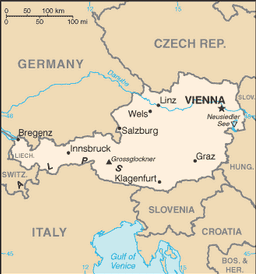Austria
 Austria is country of Europe located in central Europe.
Austria is country of Europe located in central Europe.
Details
| Official Name: | Republic of Austria |
| Capital: | Vienna |
| Total area: | 83 870 km2 |
| GDP per capita: | $42,408 |
| Native Language: | German |
| Government: | Federal parliamentary republic |
| Population: | 8,414,638 |
| Major Religion: | Roman Catholicism |
| Monetary Unit: | Euro (EUR) |
The Alps dominate the western and southern parts of Austria while the eastern provinces - including Vienna, the capital - lie in the Danube basin.
Until the end of World War I, Austria had been the centre of a vast empire, which controlled much of central Europe for centuries. Austria is now a federal republic, consisting of nine states.
Vienna hosts a number of international organisations, including the Secretariat of the Organisation for Security and Cooperation in Europe, the International Atomic Energy Agency and the Organisation of Petroleum Exporting Countries.
Austria has a rich cultural heritage. Wolfgang Amadeus Mozart occupies a place of his own as a composer, while the music of Franz Schubert also enjoys great popularity. In the world of philosophy and ideas, the work of Siegmund Freud continues to provoke controversy, while Ludwig Wittgenstein was one of the major influences in 20th century philosophical thinking. In art, the paintings of Gustav Klimt from the late 1800s are widely admired.
Austria has a mixed industrial and agricultural economy, while tourism is also an important source of income.
In cuisine, Austrian specialities such as Wiener Schnitzel and Apfelstrudel have become international dishes which need no translation.
Health & Welfare
Social insurance is comprehensive including sickness, disability, accident, old-age, and unemployment benefits, allowances for families with children, and rent aid.
Economy & Jobs
Oil production and refining, banking, railroad equipment, electric machinery, appliances, mining, iron, steel, chemical manufacturing, natural-gas, and electric power production. Jobs in machinery, textiles, iron & steel, timber, and tourism.
Main Attractions
Vienna, Eisriesenwelt Caves, Grossglockner Road, Salzburg, and St Anton skiing resorts.
Economy
Austria is the 12th richest country in the world in terms of GDP per capita, has a well-developed social market economy, and a high standard of living. Until the 1980s, many of Austria's largest industry firms were nationalised; in recent years, however, privatisation has reduced state holdings to a level comparable to other European economies. Labour movements are particularly strong in Austria and have large influence on labour politics. Next to a highly developed industry, international tourism is the most important part of the national economy. Mariahilf shopping avenue in Vienna.
Germany has historically been the main trading partner of Austria, making it vulnerable to rapid changes in the German economy. Since Austria became a member state of the European Union it has gained closer ties to other EU economies, reducing its economic dependence on Germany. In addition, membership in the EU has drawn an influx of foreign investors attracted by Austria's access to the single European market and proximity to the aspiring economies of the European Union. Growth in GDP accelerated in recent years and reached 3.3% in 2006.
Austria indicated on 16 Nov 2010 that it would withhold the December installment of its contribution to the EU bailout of Greece citing material worsening of the Greek debt situation and apparent inability of Greece to collect the level of tax receipts it had previously promised.
Since the fall of communism, Austrian companies have been quite active players and consolidators in Eastern Europe. Between 1995 and 2010, 4'868 mergers & acquisitions with a total known value of 163 bil. EUR with the involvement of Austrian firms have been announced. The largest transactions with involvement of Austrian companies have been: the acquisition of Bank Austria by Bayerische Hypo- und Vereinsbank for 7.8 bil. EUR in 2000, the acquisition of Porsche Holding Salzburg by Volkswagen Group for 3.6 bil. EUR in 2009, and the acquisition of Banca Comercială Română by Erste Group for 3.7 bil. EUR in 2005.
Tourism accounts for almost 9% of the Austrian gross domestic product. In 2007, Austria ranked 9th worldwide in international tourism receipts, with 18.9 billion US$. In international tourist arrivals, Austria ranked 12th with 20.8 million tourists.
Immigration possibilities
If you are interested in immigration to Austria, click here, and also get acquainted with the relevant migration documents